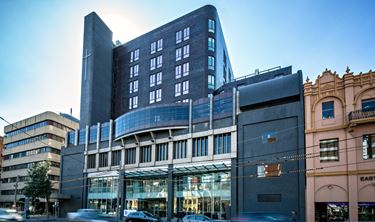Frozen Shoulder
- Home
- Services
- Orthopaedics
- Shoulder Orthopaedics
- Common Shoulder Conditions
- Frozen Shoulder
What is frozen shoulder?
Frozen shoulder is a common shoulder condition that causes extremely painful symptoms such as stiffness and restricted movement, hence the name. Ordinarily, a healthy shoulder joint is surrounded by strong connective tissue that holds the shoulder in place. For unexplained reasons, an inflammatory response can spontaneously occur in some patients, which causes the shoulder to seize up. It often occurs after an injury, a period of shoulder immobilisation or even unrelated surgery. It is also more common in patients suffering from diabetes.
As the ligaments start to thicken and the shoulder joint ‘freezes’, the pain increases and mobility decreases. This stage can last for 6 months making daily activities very difficult, progressing to severe pain, especially at night. The frozen stage can last another 6 months, with the shoulder joint becoming less painful but still feeling extremely stiff with restricted movement. As the shoulder begins to ‘thaw out’, the pain will gradually recede, and your shoulder movement will slowly return to a good range of motion.
How is it treated?
Frozen shoulder treatment is focused on reducing pain and restoring joint movement, although this can be a frustrating process in the early stages of the condition. Anti-inflammatory medication and steroids may be considered to help reduce the symptoms, along with gentle stretches that won’t aggravate the condition further. Ice and heat treatments can also help to reduce the pain. Once the pain has settled down, patients can begin an exercise program for the next 12 months designed to increase movement and strengthen the muscles.
Surgery is rarely recommended for frozen shoulder. But if there is no improvement noted after physiotherapy treatment, your doctor may recommend one of two surgical options: a full manipulation of the shoulder joint under anaesthetic to forcibly break up any stickiness, or a shoulder arthroscopy to release scar tissue.
How long does it last?
Frozen shoulder tends to occur in three separate stages.
Stage 1: The shoulder begins to freeze up. This lasts around 6 months, and the pain gradually worsens while the shoulder becomes more difficult to move.
Stage 2: The pain may improve, but the shoulder is very stiff with limited movement. This stage can last around 6 months and can make daily activities very difficult to achieve.
Stage 3: Your range of motion begins to return as the shoulder thaws out. This can last another 6 months with a full recovery sometimes taking between 1-3 years.

Shoulder replacement approaches
Find a hospital with orthopaedic services
Our Hospitals
Related services

Shoulder Orthopaedics
The shoulder is the most flexible joint in the body. It allows us an incredible range of motion.
Read More
Other Shoulder Surgeries and Procedures
Treatment pathways available to help common shoulder conditions.
Read More
Find a Specialist
Talk to our world-leading orthopaedic specialists about the most suitable treatment options.
Read More